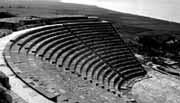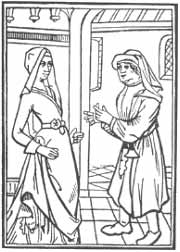THE MEDIEVAL DRAMA (3)

BUT although the evolution of the passion-play from the liturgy is obvious, we find in the mystery, when it was presented in the language of the people by the craftsmen and the burghers, one element which is not of ecclesiastical origin;--we find the element of humor, of joyous gaiety, of vivacious realism, and often indeed of reckless vulgarity. Even before it was wholly independent of the church the new drama had felt the influence of popular taste, and it had taken over more than one of the accepted devices of the primitive comic plays, such as the strolling buffoons were wont to perform. The brief farces of these wandering minstrels may have been mere dramatized anecdotes, practical jokes in dialogue, pantomimic horse-play of an elementary type; they were wholly unliterary, and being often even unwritten, they have rarely been preserved. Yet it is perfectly possible that this medieval farce, with its hearty fun and its frankness of speech, is the direct descendant of the rude humor of the Latin rustics, surviving unobserved and neglected through all the centuries of the dark ages, and serving humbly to satisfy, in some measure, the perpetual human desire for a story told in action. When at last the serious play had been developed out of the services of the church, this folk-drama was ready to supply the comic element, without which any representation of life muse needs be one-sided.
Fortunately chance has saved for our enlightenment not a few of the later specimens of this folk-play; and we can see that it was generally as unliterary and as inartistic as one might expect, and that it assumed a great variety of forms. It might be merely a burlesque-sermon satirizing the clergy or the civil authorities; it might be a monologue in which, for example, a boastful character unwillingly admitted his own unworthiness; it might be little more than a comic song with a telling refrain and with illustrative gestures; it might be a dialogue of cut-and-thrust repartee not unlike the pungent talk interchanged by the ringmaster and the clown in the modern circus; it might even be a lively little play with a simple ingenuity of situation, presenting a scene of every-day life with an abundance of pertinent detail.

Such, for example, is the French farce of theTUB with its three characters of the Husband, the Wife, and the Mother-in-law. The Husband is henpecked; and the Wife, aided by the Mother-in-law, has even gone so far as to draw up an agreement for the Husband to sign, in which he has bound himself to do all the work of the household, and in which his several duties are specified, item by item. Then, as it happens, the Wife falls into the tub in which they have been washing the household linen, and she cries to the husband to help her out. He consults the agreement, and then refuses to assist her, as that is not set down in writing. The Wife insists; and the Husband protests that he is willing to do all that he has agreed to do, but nothing more. The Mother-in-law intervenes, but she cannot extricate the Wife without the Husband"s help; and he refers her again to the document. He is ready to bake and to boil and to get up early to make the fire, as he has promised to do; but as for pulling the Wife out of the tub, that is not his duty, since it is not down in the bond. The Wife and the Mother-in-law scold and threaten at first; but at last they appeal. The Husband suggests that if he is to do more than he has bound himself to do in writing, then the agreement is really useless, and he proposes that it shall be torn up before he rescues the Wife. As her danger is now pressing, the two women agree to this; the bond is rent in twain, and the Husband extricates the Wife from the tub. The household is once more upon a peace footing; and yet the Husband, warned by experience, remarks to the spectators that he wonders how long it will last.
This little farce of THE TUB is French; but it has its analogs in the other modern literatures. It has a certain likeness to the dispute between Noah and his Wife in an English mystery--a very amusing scene, indeed, in which the spouse of the patriarch refuses to enter the ark unless she can bring her friends with her, and in which, when she is taken on board by force, she gives her venerable husband a sound box on the ear.

French, also, is the farce ofMASTER PETER PATELIN, by far the most artistic of all the medieval comic plays. Patelin is a swindling lawyer who is in the depths of poverty. He goes to a Draper and wheedles him out of six yards of woolen cloth; and when the Draper comes to him for payment, Patelin is in bed, and his Wife protests that he has not been out of the house for weeks. The Draper is almost persuaded that he is the victim of hallucination, and he returns to the shop to see if he has truly lost his cloth. Finding that it is really gone, he rushes again to Patelin"s lodging, whereupon the lawyer pretends to be mad, and overwhelms the unfortunate tradesman with a flood of words, first in one of the French dialects, and then in those of another, until at last the Draper withdraws, half believing that it is the devil who has played a trick on him. Then there comes to Patelin the Shepherd of the Draper, whom his master is suing for having stolen some sheep, and the Shepherd engages the lawyer to defend him. Patelin bids the Shepherd to pretend to be foolish and no matter what question the Judge may put to him, to answer only with the bleat of a lamb,--"Baa-a!" When the trial comes before the Judge, Patelin hides himself behind the Shepherd so that the Draper shall not see him. But the shopkeeper does catch sight of the lawyer at last, and he instantly demands payment for his cloth, to the complete astonishment of the Judge, who had supposed that he was trying the Shepherd for sheep-stealing. The Draper gets confused also, and accuses the Shepherd of stealing the cloth and the lawyer of taking the sheep. The puzzled judge questions the Shepherd, who answers no word but "Baa-a!" and Patelin adroitly pleads that the poor fellow is plainly an idiot. The Draper continues to insist on payment for his cloth, although the judge in vain begs him to come back to his sheep. In the end, the magistrate has to acquit the Shepherd for lack of evidence against him. Then the wretched Draper asks Patelin if he is not the lawyer who had been seen in bed only a few minutes before; and Patelin daringly bids him go to the house and look for himself. When the tortured tradesman has departed, Patelin turns to the Shepherd and demands his fee for getting the man off from the charge against him. And now are the tables turned; for the Shepherd simply answers, "Baa-a!" The play comes to an end swiftly with the discomfited Patelin trying vainly to catch his deceitful client.
MASTER PETER PATELIN is a French farce, to be acted by itself whenever a company of strollers happened to have five performers; but it is curiously like one of the Nativity scenes in an English mystery. When the Shepherds are watching their flocks by night, a neighbor joins them--one Mak, a man of evil repute. To keep him under guard when they go to sleep, the Shepherds make Mak lie down between them. But the precaution is unavailing, as Mak gets up, and steals a lamb, and takes it to his Wife, and then returns to his place. When the Shepherds wake, there is Mak between them; but a lamb is missing. Mak is suspected at once, and the Shepherds go to his house, where Mak"s Wife has the lamb swaddled in a cradle like a babe. The Shepherds search everywhere and find nothing, until one of them goes to the cradle and remarks that the babe has a long snout. When the lamb is discovered, Mak"s Wife promptly pretends that it is a changeling just left by an elf. The Shepherds, after punishing Mak by tossing him in a blanket, return to their flock; and almost immediately the Angel above sings to them the glad tidings of Christmas morn. Here is a comic action, complete in itself and quite detachable from the mystery, with which, indeed, it has no necessary connection. Perhaps it is even older than the mystery, and was inserted into the text merely to supply what is known nowadays as "comic relief,"--just as the farce of THE TUB might have been incorporated into a passion-play without any protest from the public.
Both in French and in English the comic scenes of the mysteries were often wholly irrelevant in theme and absolutely incongruous in treatment. No reverence for the sacred subject prevented the medieval audience from enjoying a joke, or made it very particular as to the quality of the fun it laughed at. Just as we moderns are surprised by the grinning gargoyles and by the satiric carvings of the mighty cathedrals, so in the medieval drama we are often taken aback by the bold vulgarity of the comic scenes. Although the medieval writers had not found out that brevity is the soul of wit, they often acted on the belief that breadth is the body of humor. The authors were plain of speech and the audiences were never squeamish; and as we study what was then to be seen on the stage we are reminded of Taine"s remark that in the middle ages man lived on a dunghill. It must be noted that the farces are rather more reprehensible than the comic scenes of the mysteries; and yet the grossest of these farces might be performed sometimes as the prelude to a miracle-play; thusTHE MILLERpreceded a very devout dramatization of the legend of Saint Martin. This low humor is indecorous rather than demoralizing; it shocks our sense of propriety sometimes, but it is never insidious or seductive. It was intended for the entertainment of the populace, which is often vulgar but which is rarely vicious. In the farces, as in the more serious scenes of the passion-plays, we can always see the simplicity and the sincerity which were ever the two chief characteristics of medieval endeavor.
To Be Continued